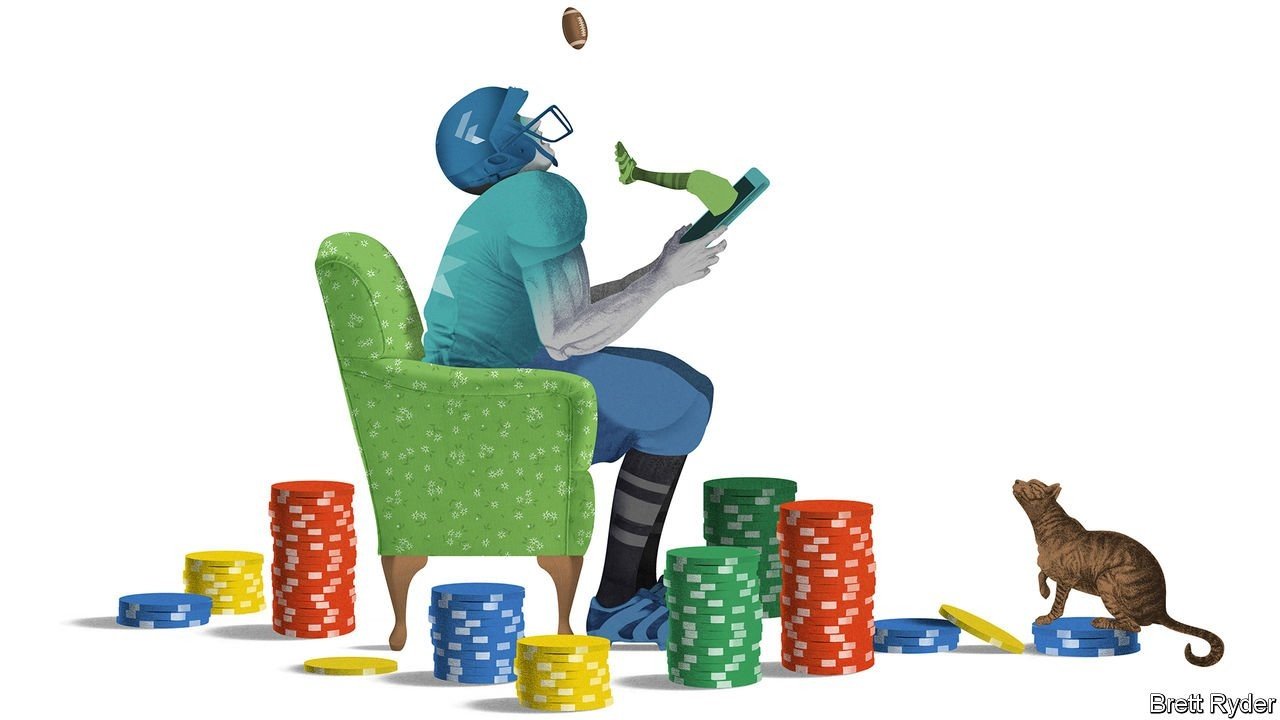https://www.economist.com/node/21803931?fsrc=rss%7Cbus
IF YOU ARE going to run a gambling operation, it helps to have luck on your side. Months after Peter Jackson was appointed boss of Flutter Entertainment in 2018, America’s Supreme Court overturned a federal law outlawing most sports betting. For a firm running established bookmakers such as Betfair and Paddy Power, that opened the door to a wagering El Dorado. Two years later Flutter’s $12bn splurge on PokerStars, an online-tournament franchise, looked dear—until a pandemic left millions at home in possession of stimulus cheques and lots of spare time. If the house always wins, Mr Jackson comes a close second.
Listen on the go
Get
The Economist app and play articles, wherever you are
Betting used to be the preserve of mob bosses and back-alley card sharps. Now it is an increasingly regulated $500bn business where ever more bets are placed on mobile phones. Executives at firms like Flutter use workaday metrics—conversion rates, cost of customer acquisition, employee engagement—familiar to managers at Amazon or McDonald’s. True, a certain brand of investor still treats gambling as irredeemably “sinful”, to be lumped in the same bucket as purveyors of booze, cigarettes and missiles. That hasn’t stopped Flutter, the largest global gaming company, from securing a berth in the blue-chip FTSE 100 index in London, backed by a market capitalisation of £25bn ($35bn). That lofty figure depends on Mr Jackson’s winning streak continuing.
It may well do. Online gambling is a rare global industry that has been dominated by European firms. Governments in Europe have usually preferred to regulate and tax what they presume would be happening anyway. Operators of bricks-and-mortar betting shops fused into groups that could better afford the investments needed to develop websites and apps. Aside from Flutter, which merged Paddy Power, Betfair and others into an Irish holding company, there is Entain, a FTSE rival, which rolled up Ladbrokes, Coral and Bwin, originally from Austria. As online casinos and poker took off, further acquisitions were made to cross-sell roulette spins to football punters.
In America the legal betting that existed before 2018 was limited and local. Most of it involved casinos and resorts; sports betting was all but banned outside Nevada. This meant that as states liberalised offering wagers on sports—as nearly half of them have now done—most of these potential American rivals lacked the expertise to calculate and serve up online the shifting odds on which New York Yankee will hit the next home run. This is precisely the sort of thing European bookies have been doing for years.
To take advantage of this “massive land grab” for sports betting, Mr Jackson did what any good gambler does: he took a calculated risk. He prepared to enter the American market before the Supreme Court decision. Within weeks of the rule change Flutter pounced on FanDuel, a “fantasy league” website where armchair quarterbacks speculated (mostly for glory, not cash) on outcomes of sporting contests. Snapping it up before rivals realised its value gave Flutter a database of loudmouths who proved keen to put money behind their bluster as soon as states started allowing it.
Forecasts of American gambling revenues are now rising as fast as Schumpeter’s losses on poker night. By 2025 analysts predict that bookmakers serving American sports fans could pocket $10bn-15bn a year in gross gaming revenue, the money they earn after paying out successful wagers. Though covid-19 briefly interrupted most sports, it nudged more potential players to online leisure, which included bingo as well as Netflix. Cash-strapped American states desperate for tax dollars to finance pandemic relief and other goals began to legalise betting on sports faster than expected. A few permitted online poker and casino games, which had also been illegal in most places. That might bring in another $5bn a year to the best brands.
Hence the land grab. Flutter argues that gaming enjoys the same network effects as other digital markets such as social media or ride-hailing. Bettors want to punt where others are betting. Early entrants can spread the cost of brands and technology across more users, further raising barriers to entry. American sports betting may indeed be a winner-takes-most market. The share of the big three operators (FanDuel; BetMGM, part-owned by Entain; and DraftKings, another “fantasy” site turned bookie) has gone from less than a third in 2018 to three-quarters now. FanDuel itself controls nearly half the market. Unmoved by heavy losses as it splurges on luring new customers, analysts value the operation at $18bn.
Ante climax
For the bet to keep paying out, Mr Jackson will have to avoid a few dud numbers. The exuberance in America contrasts with a tougher outlook elsewhere. British regulators are expected to introduce new restrictions to curb problem gambling. Germany has imposed new rules that will crimp operators’ profits. That should give pause to those who think American law is predestined for further relaxation: what the regulator giveth the regulator can take away. Few doubt that money will be made in American sports betting, so new competitors are bound to emerge seeking a share of the pot. American sports leagues are all-powerful, and have already sought a levy on wagers. Broadcasters have lots of leverage; Flutter is engaged in a legal tussle with Fox, Rupert Murdoch’s empire, which used to own a slice of PokerStars’ parent company and has an option to buy nearly a fifth of FanDuel.
The risk for Flutter is that too much of a good thing ends up generating a backlash. The company has spent $291 to acquire each American customer, mostly on ads and subsidised first bets. If Flutter is to turn a profit, punters must lose at least that much on average. For that to happen, they may need to wager a few thousand dollars. Flutter, like all other listed gaming firms, emphasises it is in the market of providing a bit of light entertainment, not minting gambling addicts. If the bookies are too successful, that argument may begin to sound even more hollow. ■
For more expert analysis of the biggest stories in economics, business and markets, sign up to Money Talks, our weekly newsletter.
This article appeared in the Business section of the print edition under the headline “Jackpot!”














